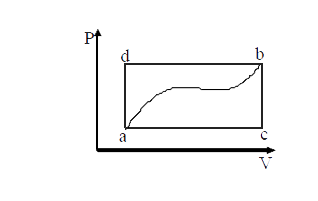For a thermodynamic process δQ=−50 calorie and W=−20 calorie. If the nitial internal energy is −30 calorie then final internal energy will be-
191.20 Calorie
−60 Calorie
100 Calorie
–100 Calorie
The correct Answer is:B
To find the final internal energy, we can use the first law of thermodynamics, which states:
ΔQ=ΔU+W
Where:
- ΔQ is the change in heat,
- ΔU is the change in internal energy,
- W is the work done by the system.
Given:
- ΔQ=−50 calories,
- W=−20 calories,
- Initial internal energy Uinitial=−30 calories.
We need to find the final internal energy Ufinal.
Step 1: Rearranging the First Law of Thermodynamics
We can rearrange the first law equation to solve for the change in internal energy:
ΔU=ΔQ−W
Step 2: Substitute the Given Values
Now, substitute the given values into the equation:
ΔU=−50−(−20)
Step 3: Simplify the Equation
This simplifies to:
ΔU=−50+20=−30 calories
Step 4: Calculate Final Internal Energy
Now, we can find the final internal energy using the change in internal energy:
Ufinal=Uinitial+ΔU
Substituting the values:
Ufinal=−30+(−30)=−60 calories
Conclusion
Thus, the final internal energy Ufinal is −60 calories.
---
- ΔQ is the change in heat,
- ΔU is the change in internal energy,
- W is the work done by the system.
- ΔQ=−50 calories,
- W=−20 calories,
- Initial internal energy Uinitial=−30 calories.
Topper's Solved these Questions
- HEAT-2 BOOK - MOTIONCHAPTER - HEAT-2 EXERCISE - EXERCISE-2 (LEVEL-I)
24 Videos
- HEAT-2 BOOK - MOTIONCHAPTER - HEAT-2 EXERCISE - EXERCISE-2 (LEVEL-II)
13 Videos
- HEAT-2 BOOK - MOTIONCHAPTER - HEAT-2 EXERCISE - EXERCISE-4 (LEVEL-II)
30 Videos
- HEAT TRANSFER & THERMAL EXPANSION BOOK - MOTIONCHAPTER - HEAT TRANSFER & THERMAL EXPANSION EXERCISE - Exercise - 3 Section-B
19 Videos
- HYDROSTATIC, FLUID MECHANICS & VISCOSITYBOOK - MOTIONCHAPTER - HYDROSTATIC, FLUID MECHANICS & VISCOSITYEXERCISE - EXERCISE -3 (SECTION-B) PREVIOUS YEAR PROBLEM
7 Videos
Similar Questions
In the adjoined figure the indicator diagram of an ideal thermodynamic gas system is represented. If the change in internal energy along the path acb is 10 calorie then change in internal energy along the path bda will be

View SolutionIn thermodynamic process pressure of a fixedmass of gas is changed in such a manner that the gas releases 30 joule of heat and 18 joule of work was done on the gas. If the initial internal energy of the gas was 60 joule, then, the final internal energy (in J) will be :
View Solution
Knowledge Check
For a thermodynamic process δQ=–50 calorie and W = – 20 calorie. If the initial internal energy is – 30 calorie then final internal energy will be -
A191.20 CalorieB– 60 CalorieC100 CalorieD– 100 CalorieIn an isochoric process the increase in internal energy is
AEqual to the heat absorbedBEqual to the heat evolvedCEqual to the work doneDEqual to the sum of the heat absorbed and work doneIn an isochoric process the increase in internal energy is
AEqual to the heat absorbedBEqual to the heat evolvedCEqual to the work doneDEqual to the sum of the heat absorbed and work done
The pressure of given mass of a gas in a thermodynamic system is changed in such a way that 20 joule of heat is released from the gas and 8 joule of work is done on the gas. If the initial internal energy of the gas was 30 joule then final internal energy will be
View SolutionIn a thermodynamic process, pressure of a fixed mass of a gas is changed in such a manner that the gas release 20J of heat and 8J of work is done on the gas. If initial internal energy of the gas was 30J, what will be the final internal energy?
View SolutionIn a thermodynamic process, pressure of a fixed mass of a gas is changed in such a manner that the gas release 20J of heat and 8J of work is done on the gas. If initial internal energy of the gas was 30J, what will be the final internal energy?
View SolutionIn a thermodynamic process pressure of a fixed mass of a gas is changed in such a manner that the gas releases 30 joules of heat and 10 joules of work was done on the gas. If the initial internal energy of the gas was 30 joules , then the final internal energy will be
View SolutionIn thermodynamic process, pressure of a fixed mass of a gas is changes in such a manner that the gas molecules gives out 20 J of heat and 10 J of work is done in the gas. If the initial internal energy of the gas was 40 J, then the final internal energy will be
View Solution
